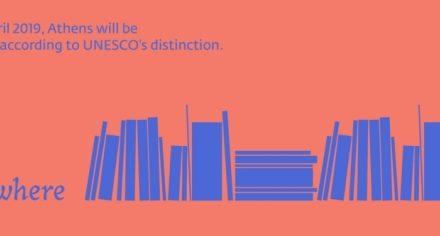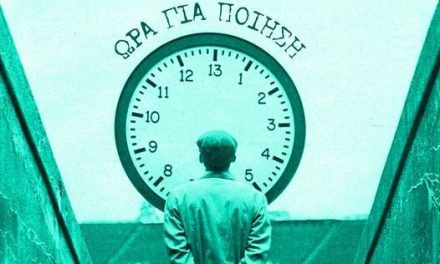Little bookstores constitute an integral part of our culture and our local communities. It’s the place where writers can connect with readers, where we discover new, unknown worlds, where children are captivated by the thrill of reading that can last a lifetime. They are the places that never stop inspiring us, uniting us and spreading the love for books. Their role proves crucial in case they are located in remote areas such as the Greek islands or the Greek countryside.
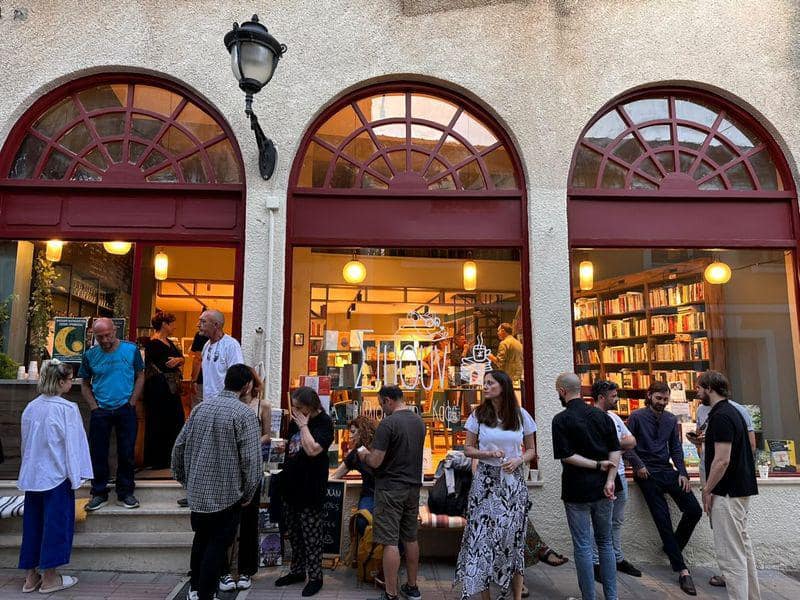
Reading Greece* spoke to Elpida and Dimitris, owners of “Simoun”, a beautiful little bookstore in Preveza, Epirus, about the role of little bookstores and their influence on reading preferences, as well as the challenges they are faced with and the prospects ahead.
Simoun is a beautiful little bookstore in Preveza. What’s the story behind this venture of yours?
Our story begins when we left Athens and moved to Preveza. We have always been ardent readers and supported little bookstores. We often discussed the possibility of opening our own little independent bookstore one day. But surely such a step in Athens would be extremely difficult. Yet, we saw that things might be a little more favourable for us in Preveza. The town had been lacking a good classic bookstore, while people there were quite active and important cultural events took place. Somehow the idea of opening our own bookshop began to take form in our minds.
Our vision was to create a place that would operate as a living cell. We wanted our bookstore to be extroverted, to host beautiful conversations and book presentations, while also allowing everyone to feel at home. This is how we ended up with Simoun books and coffee. We reckon that it is no coincidence that bookstores-cafés are increasingly popular and have been “embraced” by readers. They create a warm atmosphere and a more familiar environment. So, after much thought and fully aware of the difficulties facing little independent bookstores, we decided to open Simoun, our second child!
What kind of books can readers find in your bookstore?
In Simoun one can find all kinds of books. The majority of our books are literary but we are also up to date in essays, mainly history, politics, philosophy and psychology, while a large part is dedicated to children’s books which we love. Apart from these we have a section of foreign language books in English, German, Italian and French. It is somewhat self-evident that little bookstores cannot absorb the entire volume of book production, but we try to have the newest editions and the most important classics. As for the rest, we choose books according to our own reading preferences.
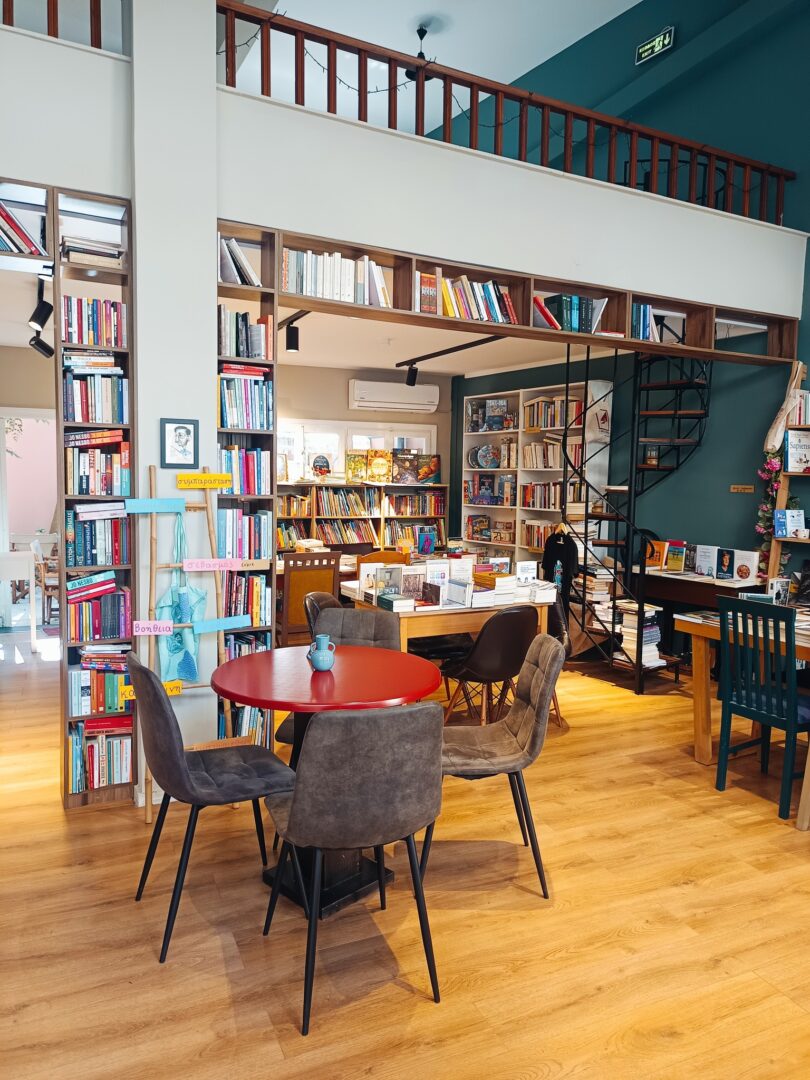
How important is the role of little bookstores? How do they influence reading preferences?
Little bookstores have always been cultural pillars. You can tell a lot about a place by the bookshops you find there. We believe that in urban centers little bookstores play the same role, yet in small regional towns (like ours) this becomes even more obvious. For example, people come to us who ask to learn about the town’s cultural events; the bookstore is where the meetings of cultural institutions that do excellent and long-term work in the town, such as the Preveza Film Club or the Preveza Jazz Festival etc, take place. This alone creates a condition that touches on wider issues of culture than just books.
At the same time, of course, little independent bookstores also play their “natural” role in relation to culture, the one that relates to books. So, indeed, each bookshop influences its readers depending on the choice of books, as well as on what the people of the bookstore themselves read. For example, we would certainly recommend a book that we have read and liked a lot more easily compared to another that didn’t touch us so much.
Which are the main challenges little bookstores face nowadays? How do you respond to these challenges? What about the prospects ahead?
A little bookstore today is certainly in a worse position than it was fifteen years ago. It is no coincidence that for a long time in Greece bookstores were not opening but instead were closing. The difficulties are many and have to do with the presence in the field of large companies that offer books at more competitive prices, as well as with the well-established practice of ordering books through the internet. We should also consider that readership has also decreased considerably compared to the past.
However, we believe that there will always be a place for little bookstores and that people will always end up there. E-commerce and the impersonal big chains cannot replace the relationship that readers build between themselves and booksellers. It is no coincidence that in recent years we have seen a resurgence of little independent bookshops.
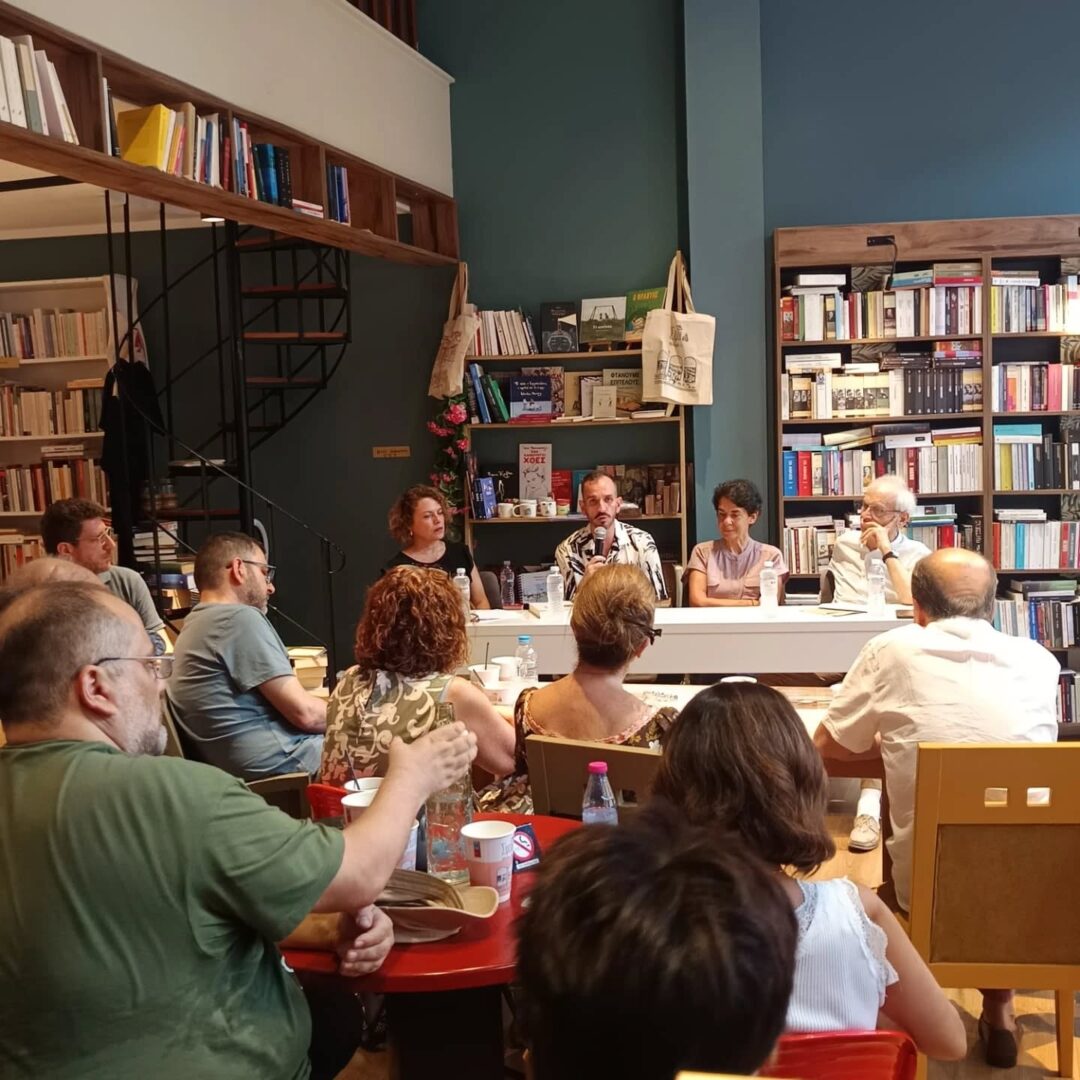
Would you say that the recent socio-economic crisis and the pandemic that followed has broken the ties connecting part of the readers with the choices and orientation of traditional publishers, creating an aesthetic and intellectual space that may certainly grow?
We believe that nowadays readers are demanding and they are very right to be. Following the crisis and the pandemic people can spend less money on books than before and for this reason they have become more selective in what they will read. In addition, because now adult readers can more easily find out about a book before they buy it and, at the same time, they now trust more easily new and promising publishers who offer a fresher view of books, they will certainly more easily turn to these publishers and reject traditional publishers.
In the era of online communication, how have the social media influenced what people choose to read? How have reading preferences changed/evolved during the years?
It is certain that social media nowadays have a huge influence on the choices of readers. We see that publishers and bookstores, like us, put a lot of emphasis on promoting books through social media. It is evident that books from publishers that put more emphasis on this part usually end up being in the best-selling lists. Certainly, this is a big change from the traditional way of selecting readers in the past, but on the other hand, in our opinion, it is also a way for books to become widely known and perhaps reach a person who would not choose to read at all or would otherwise make different choices.
*Interview by Athina Rossoglou
TAGS: LITERATURE & BOOKS | READING GREECE


